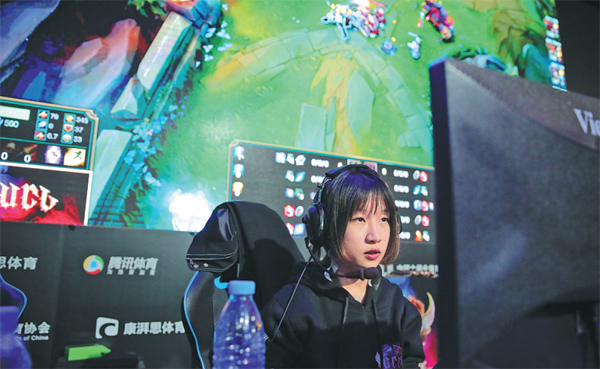Violence proves a barrier to gamers' Olympic dreams


The evolution of e-sports has been the subject of much debate: Some see a brighter future, while others warn of looming danger.
To address the healthy development of e-sports, the Asian E-sports Collaboration Summit was held in Shanghai on April 11.
Asian E-sports Federation President Kenneth Fok Kaikong, who attended the summit, said he believed in the positive value of e-sports' evolution.
Fok said e-sports will evolve beyond people's imagination and he can imagine the combination of e-sports and advanced technologies such as artificial intelligence and virtual reality.
"We must actively embrace new technologies," Fok told the Titan Sports newspaper at the summit. "E-sports have shifted the battleground from personal computers to mobile devices, and it is constantly changing. New technologies like AI and VR will become more mature. Even drones and robots could evolve into the e-sports of the future."
Chen Jiang, an associate professor at Peking University's School of Electronics Engineering and Computer Science who started an e-sports class in spring, said e-sports have advantages that traditional sports lack.
"Some sports can remain unchanged for decades, but e-sports can evolve much more quickly," Chen said. "There will always be upgraded versions of games and even new types of games coming out, which will always bring new excitement to players and fans."
Amateur gaming competitions have existed since the 1970s. Arguably the first e-sports event took place at Stanford University in the United States in 1972, when students battled each other in the game Spacewar for the grand prize of a year's subscription to Rolling Stone magazine.
The e-sports landscape has changed dramatically since Spacewar, with the emergence of different types of games and changing platforms.
According to the 2017 China Game Industry Report released by Tencent's Penguin Intelligence in June, mobile games had a 49.5 percent share of China's gaming market in 2016, while games on personal computers had 35.2 percent.
In terms of game types, 63 percent of Chinese e-sports fans like multiplayer online battle arena, or MOBA, games such as League of Legends, 31 percent like shooting games and only 7 percent like sports games.
However, some of the most popular types of games could endanger the healthy development of e-sports.
The Olympic Council of Asia has confirmed that e-sports will be part of the 2018 and 2022 Asian Games, while the International Olympic Council has said e-sports "could be considered a sporting activity".
But one of the preconditions for adding e-sports to the Olympics is that they should share Olympic values-in other words, no violence.
However, violence remains the main attraction of gaming, with the basic aim of the most popular MOBA and shooting games being to rack up the kills.
The violence problem could block e-sports' road to the Olympics and harm the younger generations that make up most of the e-sports fan base, Fok warned.
"We have to make e-sports embrace the Olympic spirit," he said.
"We need to promote the positive values of traditional sports and try our best to deal with the violence problem of e-sports.
"We need to regulate it and have an industry code."
Apart from dealing with the violence problem, Fok has bigger ambitions for e-sports.
"We want to promote Chinese culture through e-sports," he said.
"We're trying to create a model that combines sports, Chinese culture and technology. We will dig out content from Chinese history and culture and use it to create better products."
- 14 injured in off-road racing accident in East China
- China to beef up personal data protection in internet applications
- Film-like lining in school uniforms prompts investigation in Inner Mongolia
- High-temperature geothermal resource discovered in Shandong
- Earthquake strikes Guizhou county early morning
- A continued commitment to the people



































